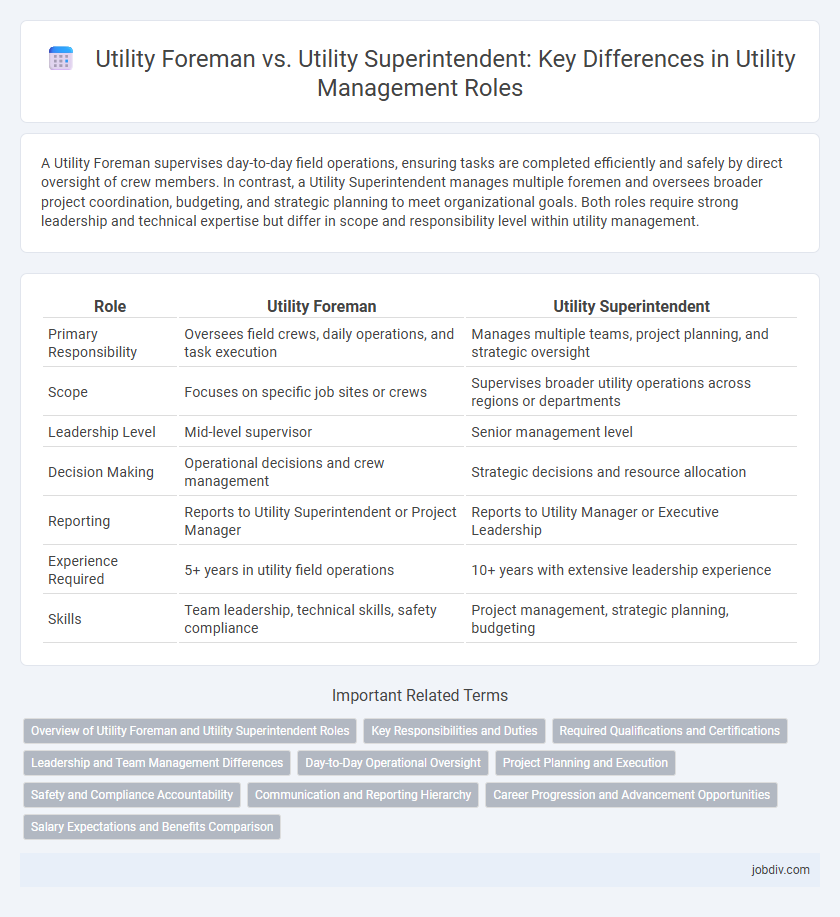A Utility Foreman supervises day-to-day field operations, ensuring tasks are completed efficiently and safely by direct oversight of crew members. In contrast, a Utility Superintendent manages multiple foremen and oversees broader project coordination, budgeting, and strategic planning to meet organizational goals. Both roles require strong leadership and technical expertise but differ in scope and responsibility level within utility management.
Table of Comparison
| Role | Utility Foreman | Utility Superintendent |
|---|---|---|
| Primary Responsibility | Oversees field crews, daily operations, and task execution | Manages multiple teams, project planning, and strategic oversight |
| Scope | Focuses on specific job sites or crews | Supervises broader utility operations across regions or departments |
| Leadership Level | Mid-level supervisor | Senior management level |
| Decision Making | Operational decisions and crew management | Strategic decisions and resource allocation |
| Reporting | Reports to Utility Superintendent or Project Manager | Reports to Utility Manager or Executive Leadership |
| Experience Required | 5+ years in utility field operations | 10+ years with extensive leadership experience |
| Skills | Team leadership, technical skills, safety compliance | Project management, strategic planning, budgeting |
Overview of Utility Foreman and Utility Superintendent Roles
Utility Foremen are responsible for supervising field crews performing installation, maintenance, and repair of utility infrastructure, ensuring compliance with safety standards and efficient work execution. Utility Superintendents oversee multiple crews and project managers, managing operational budgets, scheduling, and strategic planning to meet organizational goals. Both roles require strong leadership and technical knowledge but differ in scope, with Superintendents focusing on high-level coordination and Foremen on direct crew management.
Key Responsibilities and Duties
Utility Foremen oversee daily field operations, ensuring crews adhere to safety standards while maintaining and repairing utility infrastructure. Utility Superintendents manage broader project logistics, coordinate multiple teams, and develop strategic plans for utility service delivery. Foremen focus on hands-on supervision, whereas Superintendents emphasize management and long-term operational efficiency.
Required Qualifications and Certifications
Utility Foreman typically requires a high school diploma or equivalent, with several years of experience in utility maintenance and operations, along with certifications such as OSHA safety training and confined space entry. Utility Superintendent generally demands a higher educational background, often a bachelor's degree in engineering or related fields, combined with advanced certifications like project management professional (PMP) and state-issued utility operator licenses. Both roles emphasize strong leadership skills, knowledge of safety regulations, and proficiency in managing utility infrastructure and personnel.
Leadership and Team Management Differences
Utility Foreman typically leads frontline teams, focusing on direct supervision, daily task coordination, and hands-on problem-solving to ensure operational efficiency. Utility Superintendent holds a broader leadership role, managing multiple foremen, strategic planning, resource allocation, and higher-level decision-making for large-scale utility projects. The key difference lies in the scope of leadership, with superintendents emphasizing overall team management and long-term project outcomes, while foremen concentrate on immediate team guidance and workflow execution.
Day-to-Day Operational Oversight
A Utility Foreman supervises daily field operations, coordinating crews to ensure timely maintenance and emergency repairs in water, gas, or electric utilities. The Utility Superintendent oversees multiple foremen and broader operational workflows, focusing on resource allocation, compliance with safety regulations, and strategic planning to optimize overall utility service delivery. Foremen manage on-the-ground task execution while Superintendents ensure alignment with organizational objectives and regulatory standards.
Project Planning and Execution
Utility Foremen oversee on-site project execution, managing crews and ensuring daily tasks align with safety standards and project specifications. Utility Superintendents plan and coordinate overall project workflows, allocate resources efficiently, and monitor progress to meet deadlines within budget constraints. Both roles require expertise in utility infrastructure but differ in scope, with foremen focusing on tactical operations and superintendents driving strategic project planning.
Safety and Compliance Accountability
Utility Foremen oversee daily field operations, directly ensuring that safety protocols are implemented and followed by crew members to maintain compliance with OSHA regulations. Utility Superintendents hold broader accountability, managing multiple crews and enforcing comprehensive safety programs while ensuring adherence to environmental and industry standards across all utility projects. Both roles require a deep understanding of regulatory compliance, but superintendents prioritize strategic oversight, whereas foremen focus on operational safety execution.
Communication and Reporting Hierarchy
Utility Foremen directly communicate with field crews and report operational progress to the Utility Superintendent, ensuring accurate and timely updates on project status and safety conditions. Utility Superintendents maintain higher-level communication with management and stakeholders, synthesizing reports from multiple foremen to coordinate large-scale utilities operations and resource allocation. This structured reporting hierarchy streamlines decision-making and improves operational efficiency within utility management systems.
Career Progression and Advancement Opportunities
Utility Foremen typically oversee daily operations and coordinate field crews, gaining hands-on leadership experience essential for career growth in the utility sector. Advancement to Utility Superintendent involves broader responsibilities, including strategic planning, budget management, and staffing decisions, reflecting a significant step up in organizational hierarchy. Professionals aiming for long-term career progression often pursue additional certifications and leadership training to transition from foreman to superintendent roles effectively.
Salary Expectations and Benefits Comparison
Utility Foremen typically earn an annual salary ranging from $55,000 to $75,000, reflecting their supervisory role in field operations, while Utility Superintendents command higher salaries between $85,000 and $110,000 due to broader managerial responsibilities. Benefits packages for both positions often include health insurance, retirement plans, and paid time off, though superintendents may receive enhanced perks such as performance bonuses and executive-level health coverage. Salary growth potential and job security also tend to be more favorable for Utility Superintendents given their strategic and administrative roles within the utility industry.
Utility Foreman vs Utility Superintendent Infographic

 jobdiv.com
jobdiv.com